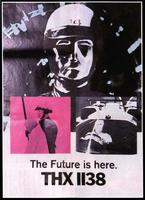 I saw Michael Bay’s The Island over the weekend. Not good. But it does contain one of the best highway smashup sequences I’ve ever seen.
I saw Michael Bay’s The Island over the weekend. Not good. But it does contain one of the best highway smashup sequences I’ve ever seen. It’s about an hour and a half into the movie and is over far too quickly, but it’s almost worth the price of admission. Runaway clones Lincoln (Ewan McGregor) and Jordan (Scarlett Johansson) have stowed away aboard a Mack truck that rockets down the Interstate with a cargo of train car axle-wheels. Behind them, cops and bounty hunters give chase in a variety of souped up vehicles, guns blazing. For a glorious 30 seconds (a minute at most) the pretty couple simply roll the cargo (made deadly by speed and proximity) off the back end of the semi, sending the giant iron barbells bouncing merrily down the highway. The carapace-crunching results are akin to watching someone toss cannonballs into a crystal shop, but viscerally more satisfying, because the crystal in question is made not just of glass but of steel and chrome. (It’s okay: Bay doesn’t invite us to imagine that there might be people inside these baroquely rendered wrecks.) There’s a great moment when we watch a tire fly off a crumpled van (or was that a car?) and bounce jauntily across several lanes and we realize that Bay has envisioned this entire set piece around the kinetic joy of this suddenly liberated object. On the Tinkertoy plane of the highway, Bay’s monster axle-wheels are no less bouncy. One wishes it was possible to say the same of the movie as a whole.
 Unfortunately, the highway mayhem is the best scene in the film, which is not surprising since it plays to Bay’s strength as a smash-poet. Given the incoherence of the film’s narrative, I’m surprised that some critics are coddling Bay right now because they can see that he’s borrowed a copy George Lucas’s THX 1138 from Blockbuster and is trying to pass his viewing experience off as an idea. (For those seeking a true example of empty pastiche with which to compare Casey and Scioli’s promising GØDLAND series, here it is.) William Arnold of the Seattle Post-Intelligencer, for instance, is reassured “that beneath all those special-effects explosions there’s a kinder, gentler Michael Bay struggling to get out.” Well, maybe. And maybe Arnold is just a nicer guy than I am, but I find it hard to be this magnanimous when I watch someone squander a cast of this quality on a film whose ideas and aesthetic are this confused.
Unfortunately, the highway mayhem is the best scene in the film, which is not surprising since it plays to Bay’s strength as a smash-poet. Given the incoherence of the film’s narrative, I’m surprised that some critics are coddling Bay right now because they can see that he’s borrowed a copy George Lucas’s THX 1138 from Blockbuster and is trying to pass his viewing experience off as an idea. (For those seeking a true example of empty pastiche with which to compare Casey and Scioli’s promising GØDLAND series, here it is.) William Arnold of the Seattle Post-Intelligencer, for instance, is reassured “that beneath all those special-effects explosions there’s a kinder, gentler Michael Bay struggling to get out.” Well, maybe. And maybe Arnold is just a nicer guy than I am, but I find it hard to be this magnanimous when I watch someone squander a cast of this quality on a film whose ideas and aesthetic are this confused.  I would never fault an SF/action film for having intellectual ambitions, and I’d be lying if I said I didn’t get a charge out of Bay’s fetish for destruction (the easiest target for Bay’s shrillest, schoolmarmiest critics). But some time ago, James Cameron’s masterful T2 (1991) showed us that we can have our cake and eat it too--that the SF/action film and big ideas about the nature of Being can be brought together in a way that sacrifices neither thrills nor profundity.
I would never fault an SF/action film for having intellectual ambitions, and I’d be lying if I said I didn’t get a charge out of Bay’s fetish for destruction (the easiest target for Bay’s shrillest, schoolmarmiest critics). But some time ago, James Cameron’s masterful T2 (1991) showed us that we can have our cake and eat it too--that the SF/action film and big ideas about the nature of Being can be brought together in a way that sacrifices neither thrills nor profundity.What irks me about a film like The Island is that it sets its (lazy and sentimental) “ideas” about the ethics of human cloning, race, and the sanctity of all human life in conflict with the bone-crunching pyrotechnics of its “thrill ride” mandate, a choice that diminishes both elements, making the film less than the sum of its parts. Even if the “kinder gentler” Michael Bay supposedly incarcerated within the so-called “world’s worst living filmmaker” really means it when he piles on the slave plantation allegory (and I’m not at all convinced he does), the effect is mawkish because it looks like the director had an attack of bad conscience over his explosions and felt compelled to coat his film in a veneer of pseudo-cerebral apology. Had the film committed more fully to either the ideas or the thrills, the result would probably have been more watchable, possibly even interesting. Instead, Bay has given summer audiences the strangest sort of blockbuster: a guilty pleasure that actually seems to feel guilty.
No comments:
Post a Comment